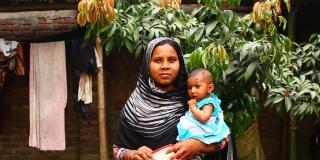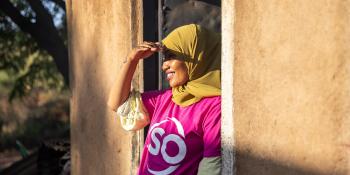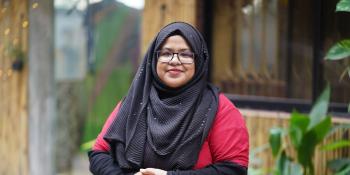
A VSO-ICS training programme in business skills has helped Rumana Khatun transform her family’s lives. Nadia Barb hears how she is enabling women in her community to follow her lead.
Twenty-six-year-old Rumana Khatun is all smiles as she talks about her time working with VSO International Citizen Service (ICS) youth volunteering programme. Her husband and one-year-old daughter sit with her as she recounts her experiences from the past few years of her life, building her business from the ground up. She feels that the benefits of her time and training with VSO ICS are abundant.
Three years ago, Khatun was living in Pairabondh village, in the Rangpur district of Bangladesh, doing tailoring work from home to supplement her husband’s low income. Today she is running her own successful business, making and supplying jute bags to the local market, and using the entrepreneurial skills she acquired during workshops with ICS volunteers.

Rumana Khatun and her daughter in the Rangpur district of Bangladesh.
Like many women from a similar social and economic background, her journey wasn’t straightforward. When Khatun was approached to join the programme, she was faced with societal pressures and concerns raised by her family. “At first, they [her family] did have a problem,” she says. “They were concerned that there would be men and women working together. As we live in a village where people are not well-educated, a lot of people said things about me going out to work and attending training. But I didn’t take notice of them and did what I felt was right.”
Although her husband was hesitant at first, once the volunteers explained the way the workshops were run and the benefits of the training programme, he backed Khatum’s decision to join the scheme. “My husband has supported me every step of the way,” she says.
Job opportunities in rural Bangladesh are scarce, especially for women. The ICS project, comprising volunteers from the UK and Bangladesh, worked with members of local youth clubs, including Khatum, to develop micro-enterprises and sustainable businesses through training and workshops.

Rumana Khatun and 30 other women recieved vocational training on how to improve sewing skills.
“When I joined, there were 30 women like myself, and we did a business development training course for three days,” says Khatun. This was followed by a two-month tailoring course to improve sewing skills.
The comprehensive business training she received has enabled her to understand every aspect of running a small enterprise: “They taught me everything I needed to know to run my own business. They showed us how to make the bags, where I can buy the material for the bags; a madam also taught us about the market.”
A loan from her ICS-supported youth club enabled Khatun to buy eight sewing machines to kick-start her business. “After I finished the training, I went to different schools to see if they would buy the bags. The price of the bags depends on the size.”
Once the schools started purchasing Khatun’s bags, her business began to take off. She employs women from the local community to work alongside her. “I have eight women who now work under me. We learned to sew together at the tailoring course.” By working with Khatun, they too now have a stable income that contributes to the welfare of their families. Khatun’s sense of pride at being able to give back to her village shines through.
“We then started taking them [the bags] to different shops in our local market and asked if they would sell them. We supply the bags and the shop sells them. When they are sold we get some money and the shop gets some money.”
Previously, her total family income was approximately 1,000-1,500 taka (£9-£13) per month, which barely covered their basic needs. These days Khatun’s business makes around 7,000-8,000 taka (£60-£70) a month with a profit margin of 3,000-4,000 taka (£25-£35). The sizeable leap in household income means Khatun can provide significantly better nutrition and care for her one-year-old daughter, than previously possible, and it also gives her family stability.
We have to encourage women to come forward, we cannot sit at home any longer.
Rumana Khatun
The lives of Khatun’s family have been transformed by her business and the training she undertook with ICS, she wishes more women would get involved in ICS programmes and training. However, she feels that the biggest obstacle faced by women who want to work or earn a living, especially those living in rural communities, is their families. Khatun becomes serious as she contemplates what should be done to help women break with tradition and join training programmes. “We have to encourage women to come forward, and that we cannot sit at home any longer. They have to understand that if we want to earn money we may have to suffer a bit, but we have to come out of the house.”
Khatun now dreams of a brighter future for her daughter. There is a quiet confidence and sense of achievement when she says: “I want her to grow up to be a businesswoman like myself.” Her financial independence has given Khatun the ability to make decisions within her household and she wants her daughter to go to school and receive the education necessary to provide her with a better life.
Khatun is now in a wonderful position to not only expand her business but also diversify when the time comes. She is excited about the prospects that lie before her. When asked if she feels the VSO-run ICS project has helped her, she says that it has greatly improved her life. “I thank VSO every day,” she says, with a smile.
Latest posts
Protecting the biodiversity of the East Tonlé Sap Lake through aquaculture
Aquaculture — the farming of aquatic organisms, such as eels, shellfish, and seaweed, in a controlled environment — is transforming the lives of people like Mr Em Phat, who are living on the East Tonlé Sap Lake in Cambodia.

Five things women achieved this year that you might not know about
This International Women's Day, join us in celebrating the resilience of women across the globe with some female achievements you might not have heard about.

Breaking barriers: Lamia's journey of volunteering, leadership, and gender equity
Bangladesh - Lamia Tasnim's volunteering journey began in 2018, and over the course of the last six years, her passion for supporting her community has only grown.
